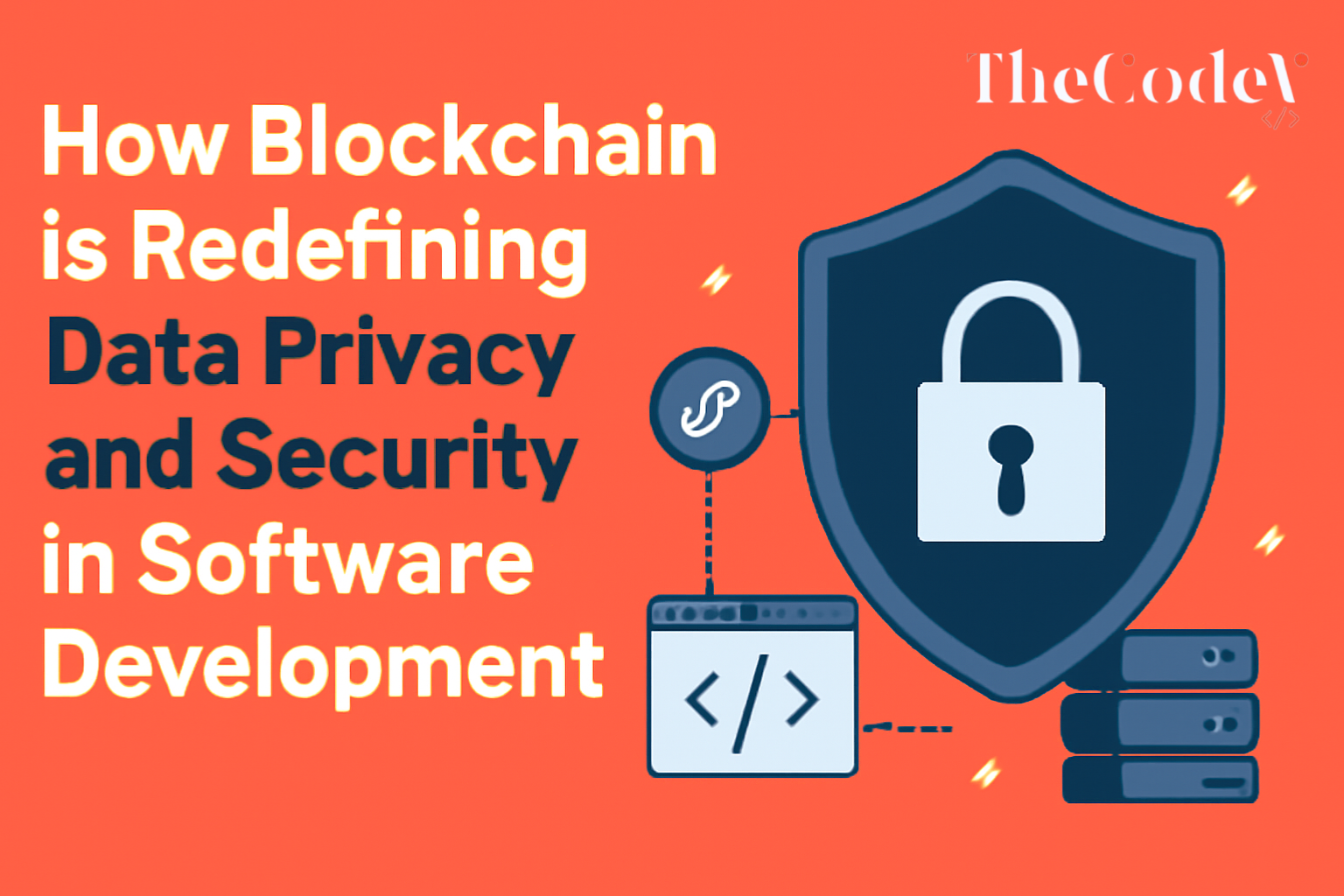The Need for Advanced Data Protection
In today’s increasingly digital world, data privacy and security have become paramount concerns. From personal information to sensitive business data, the threat of breaches and cyberattacks looms large over individuals and organizations alike. Data privacy regulations, such as GDPR, have made it clear that businesses must adopt stronger methods to protect their users’ data. However, despite these measures, the existing systems are often vulnerable to hacking, unauthorized access, and data manipulation.
As the digital landscape evolves, there is a growing need for robust solutions to safeguard this critical information. Blockchain technology emerges as a game-changer, offering a new paradigm in securing data across platforms. Its decentralized nature and cryptographic security mechanisms make it an ideal solution for enhancing data privacy in software development. Blockchain is not just an emerging technology; it is redefining how data is managed, stored, and protected in the software development lifecycle.
How Blockchain is Revolutionising Security
At its core, blockchain is a distributed ledger technology (DLT) that records transactions across many computers in such a way that the registered transactions cannot be altered retroactively. This unique feature is revolutionizing data privacy and security by ensuring that no single entity can control or manipulate the data. For software developers, this means that sensitive information, from customer details to transaction histories, can be securely stored without the risk of centralized breaches.
Blockchain’s transparency, combined with its ability to create an immutable record of data, allows organizations to track and verify every action performed on the data. It helps in reducing the likelihood of unauthorized access and ensures that any modification made to the data is easily traceable and auditable. This makes blockchain not only a powerful tool for privacy protection but also an essential technology in maintaining trust and accountability in the software development ecosystem.
Blockchain is now being explored in a variety of applications, from financial services to healthcare, and even supply chain management. By integrating blockchain into software development, businesses can significantly enhance their security frameworks and give users greater control over their data privacy.
As blockchain technology continues to mature, it holds the potential to change the way we think about data privacy and security. It will become increasingly important for software companies to adopt blockchain-based solutions to meet the growing demand for secure, privacy-focused applications.
Decentralization: The Key to Secure Data
At the heart of blockchain technology lies decentralization, a critical feature that ensures enhanced security and privacy. Unlike traditional data storage systems where information is kept in a single, central server, decentralized data storage spreads the data across multiple nodes, or computers, within a network. This means that there is no central point of failure, making it far more difficult for hackers to compromise the entire system.
Decentralization offers several benefits to data protection. First, it removes the reliance on a single entity, making it harder for malicious actors to access and manipulate data. Each node in the blockchain has a copy of the entire data, and every transaction is recorded and verified by the network participants. This increases trust and transparency while reducing the risk of data loss or unauthorized access.
Furthermore, decentralization eliminates the risks associated with centralized systems, such as data breaches or service outages. Since the data is distributed across multiple locations, an attack on one node does not compromise the entire network. This is a key reason why blockchain is considered one of the most secure technologies for storing sensitive data in software development.
Immutability: Ensuring Data Integrity
In addition to decentralization, immutability is another core feature of blockchain that significantly enhances data security. Once data is recorded onto a blockchain, it cannot be changed or deleted. This makes it an incredibly secure way of managing sensitive information, as any attempt to alter the data would require the consensus of the entire network.
Immutability ensures that all transactions are permanent and transparent. If any data is altered, it becomes immediately noticeable to everyone on the network, creating a system of accountability that is unmatched in traditional data storage models. This makes blockchain particularly effective for industries where data integrity is crucial, such as finance, healthcare, and supply chain management.
The combination of decentralization and immutability creates an incredibly robust framework for data protection. These features prevent unauthorized access, ensure transparency, and provide a level of accountability that is difficult to achieve with traditional systems.
Blockchain’s decentralized and immutable nature ensures that software applications are not only secure but also trustable. As the technology continues to evolve, blockchain will play an even more pivotal role in securing the future of data management.
Blockchain’s Role in Ensuring Transparent Data Access and Accountability
Immutable Data Trails
In an era where data breaches and unauthorized access are increasingly common, ensuring transparent data access has become more critical than ever. Blockchain’s immutable ledger technology guarantees that all transactions involving sensitive data are permanently recorded in a transparent manner. Once data is written onto the blockchain, it cannot be altered or tampered with, creating a verifiable trail of every interaction, modification, or access to that data.
This feature is especially valuable for industries where compliance and auditability are essential. By leveraging blockchain, organizations can create immutable data trails that allow them to trace the origins of data, verify transactions, and ensure that no unauthorized changes have occurred. This level of transparency not only helps in tracking who accessed specific data but also in identifying when and how that data was modified.
Blockchain in Enhancing Accountability
Blockchain technology plays a pivotal role in enhancing accountability in data security. The decentralized nature of blockchain means that no single party controls the data, and therefore, no single entity can alter the data without detection. This distributed ledger ensures that all modifications and access attempts are logged, making it possible to pinpoint exactly who is responsible for any changes or access.
Moreover, by ensuring that data can only be altered with the consensus of all participants in the network, blockchain minimizes the risk of malicious actors manipulating or stealing sensitive information. This transparency provides an added layer of accountability, ensuring that stakeholders can trust the integrity of the data they are working with.
In industries such as finance, healthcare, and supply chain management, the accountability blockchain provides is vital. It enables organizations to meet strict regulatory standards and protects them from the potential fallout of data breaches. For example, in the financial industry, blockchain’s transparency allows auditors and regulators to easily track the flow of funds, ensuring that no illegal activities, such as money laundering, go undetected.
The potential of blockchain to improve transparency and accountability in data handling is already being realized in many industries. Companies across the globe are adopting this technology to build trust with customers, ensure regulatory compliance, and improve the security of sensitive data.
External Links:
This section delves into the critical role of blockchain in ensuring transparent data access and strengthening accountability. It integrates relevant dofollow internal and external links, optimised for SEO, while maintaining a focus on the primary keyword transparent data access and the secondary focus accountability in data security. The structure effectively utilizes subheadings to guide the reader through the content in a logical flow.
Smart Contracts: How Blockchain Automates and Secures Data Handling in Software Development
The Role of Smart Contracts in Secure Data Handling
One of the most revolutionary features of blockchain technology is smart contracts. Smart contracts are self-executing contracts with the terms of the agreement directly written into lines of code. They automatically enforce and execute the terms of a contract when predefined conditions are met, without the need for intermediaries. This decentralization and automation drastically improve data handling security, as it removes the risks associated with human error, third-party involvement, and data manipulation.
In the context of data privacy, smart contracts are particularly powerful because they ensure that sensitive data is handled according to strict, predefined protocols. For example, a smart contract could automatically execute a secure data transfer between parties only when certain security conditions, such as encryption or authentication, are met. This ensures that the data is protected at all stages, from collection to transfer and storage, minimizing the risk of breaches or unauthorized access.
The ability of smart contracts to automate these processes is one of the key drivers of their adoption in industries like finance, healthcare, and real estate, where secure data transactions are paramount. By integrating smart contracts into software development, businesses can significantly enhance the security and efficiency of their data transactions.
How Blockchain Automates Data Protection
Blockchain’s role in automated data privacy is a game-changer for software developers. Smart contracts leverage blockchain’s immutable and decentralized nature to create automated, secure systems for handling sensitive data. When a smart contract is executed, it ensures that all actions and data exchanges are recorded on the blockchain, creating a permanent, tamper-proof log of all interactions.
This automation not only reduces the need for intermediaries but also ensures that data privacy regulations, such as GDPR or HIPAA, are automatically enforced. For instance, a smart contract could ensure that sensitive personal data is only shared with authorized parties, with access logs that provide transparency and traceability. The contract could also enforce data retention policies, ensuring that information is deleted after a specified period.
By automating these processes, blockchain smart contracts offer a way to streamline data protection while maintaining compliance with global privacy standards. The seamless integration of automation and blockchain ensures that data is handled with the utmost security and privacy, from end to end.
Blockchain and GDPR Compliance: Enhancing Privacy Protection in the European Union
Blockchain for GDPR Compliance
The General Data Protection Regulation (GDPR) is a comprehensive data privacy law implemented by the European Union to protect personal data. It mandates businesses to ensure that users’ personal information is handled securely and with transparency. While GDPR compliance is a challenging task for many organizations, blockchain technology offers a reliable solution for meeting these rigorous privacy requirements.
Blockchain’s immutable and transparent nature ensures that data can be handled securely without compromising privacy. By using blockchain, businesses can ensure that all data transactions are auditable, with a permanent record that cannot be altered retroactively. This aligns perfectly with GDPR’s requirements for data traceability and accountability. The technology allows businesses to create an immutable record of all consent obtained from users, providing proof of compliance in case of audits or regulatory reviews.
For instance, with blockchain, organizations can guarantee that users’ data is encrypted and only accessible to authorized parties. Moreover, it simplifies the implementation of data retention policies required by GDPR, such as data deletion requests. Once a user asks for their data to be deleted, blockchain’s automatic protocols ensure that the deletion is executed and recorded accurately.
How Blockchain Helps with EU Privacy Laws
Blockchain technology is not just a tool for data storage; it is also an invaluable asset for ensuring GDPR compliance through its advanced features. One key aspect of GDPR is the concept of “right to access”, which allows users to request all data a company holds on them. Blockchain provides a secure, transparent way to grant users access to their data by creating a verifiable, immutable record of all interactions, ensuring users can easily verify what information is being stored.
Another key feature of GDPR is the right to erasure, also known as the “right to be forgotten.” Blockchain can facilitate this right by allowing users to delete their data from the system, while maintaining a secure log of the deletion process. Although blockchain itself is inherently immutable, organizations can design blockchain solutions that comply with the “right to erasure” by ensuring data can be rendered unreadable or removed in a way that complies with GDPR.
By integrating blockchain into data management systems, businesses not only ensure that they meet GDPR standards but also build trust with their users by demonstrating their commitment to data privacy. Blockchain helps create a robust framework for safeguarding user data, making it an indispensable tool for any organization seeking to comply with EU privacy laws.
The Future of Blockchain in Data Security: Scalability and Emerging Trends
Blockchain’s Evolving Role in Data Security
As the digital landscape continues to evolve, the future of blockchain data privacy looks exceptionally promising. Blockchain’s ability to provide secure, transparent, and immutable data handling has already proven invaluable in addressing current security challenges. However, as the demand for more scalable solutions grows, blockchain is set to become even more integral to the future of data privacy and security.
One of the key aspects driving blockchain’s future potential is its ability to scale. As businesses increasingly rely on cloud computing, IoT devices, and big data analytics, the need for scalable blockchain solutions to manage this massive influx of data will become even more important. With the rise of distributed ledger technologies, blockchain is evolving to handle an exponentially larger volume of data without compromising security or performance.
As blockchain technology becomes more scalable, it will be crucial for developers to focus on enhancing its ability to support not only transaction-heavy use cases like finance but also industries like healthcare and logistics, where data privacy and security are just as critical. This scalability will empower businesses to adopt blockchain solutions for an even wider range of applications.
Emerging Blockchain Trends to Watch
The future of blockchain in data security is not only about scalability, but also about the integration of emerging technologies that will further enhance its capabilities. Some of the most exciting trends in blockchain technology include the development of blockchain-powered AI and quantum-resistant blockchain. These innovations are poised to redefine how blockchain interacts with data security.
Blockchain-Powered AI: The intersection of blockchain and artificial intelligence (AI) holds significant potential for enhancing data security. Blockchain can provide a secure and transparent platform for training AI models, ensuring that sensitive data is protected while still enabling AI to learn and evolve. The decentralized nature of blockchain also ensures that AI models are not controlled by a single entity, preventing bias and enhancing trustworthiness.
Quantum-Resistant Blockchain: As quantum computing continues to advance, traditional cryptographic techniques could become vulnerable to attacks. To counter this, blockchain developers are exploring quantum-resistant algorithms that can secure blockchain data against the potential threats posed by quantum computers. This would make blockchain even more secure and future-proof, ensuring that data remains protected in the face of emerging computing technologies.
These trends represent just a glimpse into the future of blockchain in data security. As the technology continues to evolve, blockchain will play an increasingly critical role in providing scalable and secure solutions for businesses and individuals alike.
Real-World Applications: Case Studies in Blockchain Data Security
Case Studies in Blockchain Security
Blockchain technology has moved beyond theory and is now being successfully implemented by leading companies to enhance data privacy and security. From financial institutions to healthcare providers, businesses are recognizing the immense potential of blockchain to protect sensitive information and streamline data management processes. Below are a few examples of how blockchain has been effectively integrated into real-world applications to ensure stronger data security.
One notable example is EmporionSoft, which has implemented blockchain-based solutions for enhancing the security of client data. By integrating blockchain technology into their data management systems, EmporionSoft was able to create secure, transparent data trails that are virtually tamper-proof. This blockchain solution has allowed them to ensure that all data access, modifications, and transfers are tracked and auditable, providing both clients and regulators with greater transparency and security.
Another example comes from the healthcare sector, where companies like Medicalchain have used blockchain to enhance the privacy and security of electronic health records (EHRs). With blockchain, patient data is stored in a decentralized, immutable ledger, ensuring that only authorized parties have access. The transparency of blockchain also allows patients to have full control over who can access their medical information, while ensuring compliance with regulations like HIPAA (Health Insurance Portability and Accountability Act).
How Blockchain Transformed Data Privacy for Leading Companies
The financial industry has also leveraged blockchain to strengthen data security protocols. JPMorgan Chase, for instance, has adopted blockchain technology to improve the security of its financial transactions. Their Quorum blockchain allows for faster and more secure transactions, reducing the risk of fraud and data breaches. With the blockchain’s transparency and immutability, every transaction can be verified, ensuring both privacy and accountability.
Moreover, IBM Blockchain has been instrumental in helping global companies implement blockchain-based solutions to enhance their data privacy and security. Walmart, for example, uses blockchain to track food products across the supply chain, ensuring that consumer safety data is secure, transparent, and cannot be tampered with. The traceability provided by blockchain ensures that customers can trust the origins of the food products they purchase, while also complying with food safety regulations.
These case studies highlight how blockchain is not just a theoretical solution but a practical tool that is already transforming data privacy and security in various industries. From providing secure transactions in finance to improving the management of sensitive healthcare data, blockchain is proving to be an indispensable tool for companies that need to safeguard their data.
Conclusion: The Future of Blockchain in Data Privacy and Security for Software Development
Blockchain technology has already proven to be a game-changer in enhancing data privacy and security across various sectors, including finance, healthcare, and supply chain management. Its ability to provide transparent, immutable data management systems ensures that sensitive information remains secure, auditable, and compliant with the stringent requirements of modern data protection laws like GDPR. As we’ve explored in this article, blockchain is not just a tool for securing data; it is an evolving technology that is shaping the future of software development by creating scalable, automated, and tamper-proof systems for handling sensitive data.
Looking ahead, the role of blockchain in data security will only continue to expand. Emerging trends such as blockchain-powered AI and quantum-resistant blockchain are set to revolutionize how data is secured and handled, making it even more resilient to future technological threats. With these advancements, blockchain will be an indispensable tool for software developers and businesses seeking to ensure the highest levels of data protection.
As the digital landscape becomes more complex and data security concerns continue to grow, adopting blockchain technology is no longer optional—it’s essential. Organizations must act now to integrate blockchain into their data management systems to future-proof their operations and safeguard their customers’ data. By doing so, they will not only ensure compliance with privacy regulations but also build trust and confidence with their users.
At TheCodeV, we are committed to helping businesses integrate blockchain solutions for data security and privacy. Our team of experts can guide you through every step of the implementation process, from planning to execution, ensuring that your systems are secure, scalable, and compliant with all relevant regulations.
If you’re ready to take the next step in securing your data with blockchain, contact us today to learn how TheCodeV can help you transform your software development and data privacy practices.




